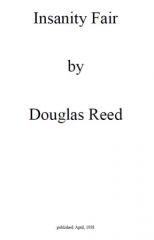
Author : Reed Douglas
Title : Insanity Fair
Year : 1938
Link download : Reed_Douglas_-_Insanity_Fair.zip
Chapter One. JOURNEY'S BEGINNING. My first glimpse of Insanity Fair was of uniforms and warlike preparations, a fitting introduction for a male of my generation. The jingle-jangle, clip-clop of horse artillery riding out of St. John's Wood barracks are the first sounds I remember hearing. I was being held up at an opposite window to watch the troops leave for South Africa; I think the arms that held me were those of a nurse, so that I must have been in better circumstances then than later. Nineteen years afterwards I leaned against the wall of a Flanders farmhouse, in a drizzling dusk, and watched horse artillerymen with streaming rubber cloaks drive their guns by. The war had finished that morning. The jingle-jangle, clip-clop took me back to the window in St. John's Wood. The years between those two wars look to me, in retrospect, like a street in Westbourne Grove or some other Victorian suburb. One day like another, one house like another, a grey vista of ugliness and repression. Many Londoners who were born around 1900 must have similar memories. The Berliner has the woods and lakes waiting for him half an hour away. The Viennese carries with him through life the picture of his native hills golden in the sun or white with snow, of becandled Christmas trees in the windows, of priestly processions chanting their way to the Stefansdom with banners of red and gold. The Budapester has his Danube and does not need to be rich to know music, wine and song. London was too big, you could not escape it. I bicycled furiously, at the week's end, in search of a green and pleasant land. Marble Arch, Maida Vale, Kilburn, Brondesbury, Cricklewood, Hendon, Edgware, Stanmore and other bosky names fell behind me, but when the time came to turn back the promised land still lay over the next horizon. I had found only a belt of pseudo-countryside, flowerless, dusty, with stunted trees. Wherever a green meadow or a shady wood offered a notice forbade me to approach it. Of country pursuits little was to be seen. The countryfolk devoted their energies to stifling the teadrinking mania of my compatriots. Every hut and hamlet bore the sign 'Teas'. Once I rode in search of the Thames, the chief river of my native land. After some hours I discovered it at Staines and spent a week's salary on the hire of a punt. This I propelled, until I tired, between a double row of notices offering me tea, forbidding me to land, and threatening me with prosecution. I came back believing that I had had a good day. The lot of a Londoner did not then seem to me insufferable. I knew nothing else. Long afterwards, when I saw other cities and countries, my gorge began to rise. Am I right now or was I right then? Anyway, when people speak longingly of their childhood and youth I feel superior to them, because my own were so dull that the present is infinitely preferable. I feel that I am living on an ascending, they on a descending scale of happiness. Those grey London years, before I sailed down Southampton Water bound for France, are like the wasteful blank pages that inexplicably begin most books. For I am a Londoner. My father came from the West Country and my mother from Ireland, but I was born in St. John's Wood and spent nearly all my days before the war between Shoot Up Hill, a pleasant name, strangely bestowed before the Petrol Age, and St. Paul's. Only once, when I was very young, did we go to live at Southend, where the sea at stated times retires out of sight. On these vast mud flats I wandered, and saw with quaking heart a drowned man fished out of the sea. Here my infant sister fell face downward while paddling in the fringes of the sea, during one of its rare visitations, and my mother with piercing cries rushed in her heavy flounced skirts and petticoats to rescue her, and, scarlet-faced and shamed by so much commotion, I drove home with them in a brougham. Here my father told me how he had kicked his top hat all the way down Queen Victoria Street on Mafeking Day and on Mafeking Night had transplanted a 'To Let' board from the garden of an empty house to the forecourt of the little church which we attended on Sundays. I was certainly in better circumstances then, for I went to a school which now claims to rank among the public schools of England, and in England public schools draw their scholars from a narrow moneyed class. The head master habitually dressed like a Scottish dominie caricatured by Punch. With long hair and beard, a tam o'shanter, and a cloak streaming behind him, he stalked about the windy streets, a picture of stern and wild Scottish righteousness, and deeply impressed the matrons of Southend. One morning he assembled the whole school in the main hall for an unknown purpose and, gaunt and terrifying, to my uneasy surprise called for 'Douglas Reed' to step forward. I was about nine years old. I stepped out and stood, the focus point of invisible dotted lines running from the curious eyes of a hundred schoolfellows. In a breathless silence the dominie spoke. I had in my possession a toy cannon; where had I got it? I had indeed a small toy cannon, worked by a spring, which I had found during playtime the day before behind a tree in the playground and had shown with much glee to other boys. I told him this. 'You lie,' said he. 'No, it's true,' I answered. 'You lie.' 'No, it's true.' 'You lie,' thundered the dominie, 'you took it from another boy's desk.' A figure of righteous wrath, he pointed a long bony finger at me, and shouted, 'Tell the truth, tell the truth!' The deity that punishes bad boys seemed to have taken earthly shape. I had an awful feeling of guilt. So holy a man could not be wrong. He roared louder, 'Did you take it from another boy's desk? Say yes!' 'Yes,' I said. I was thrashed before the school. I dared not tell my parents; they would never believe me, I thought. Some distrust of myself, which I only conquered many years later, dated from this time. We came to London. I went to another school, in Kilburn. This school was public, but not a public school. All might attend it. It was free, though for the benefit of those who strove after superiority it had a separate department where the scholars paid two shillings a week, and to this I belonged. Although we had a common playground and fell over each other's legs a great social gulf was fixed between the two-shilling boys and the free boys and we never mixed. The head master was an estimable man who habitually stood at the door through which we filed after playtime and at random picked a boy here and a boy there for a box on the ears that sounded like a pistol shot. To receive one of these unmerited buffets from the good Dr. Nairn counted on balance as a distinction. We never bore him malice and thought of him in after years with mild affection. If boys feel that a master is mean in his soul and hates them they loathe him but if their instinct tells them that he is ultimately a just man they respect him and don't give a hoot for his canings. Stands St. Augustine's where it stood? Red brick Gothic in a grey Georgian world of Avenues and Terraces, that in their drooping lace curtains and coy aspidistras belie these fair and verdant names. Cross housewives and pinched servants toiling on their knees to give a transient whiteness to the sacred front steps, their behinds turned to the blue sky and the trees. All else could be ugly and dingy, the house could be dirty without and dark within, but the front steps had to be white and the woman who did not laboriously hearthstone them in the morning was a slattern and the butt for her neighbours' malice. Is the 'recreation ground' with its sparse grass and tortured shrubs still there, and the bright yellow cake with gaudy pink icing, a slab even bigger than a man's hand for a penny? ...

Gaidoz Henri - Etudes de mythologie gauloise
Auteur : Gaidoz Henri Ouvrage : Etudes de mythologie gauloise Année : 1886 Lien de téléchargement :...














